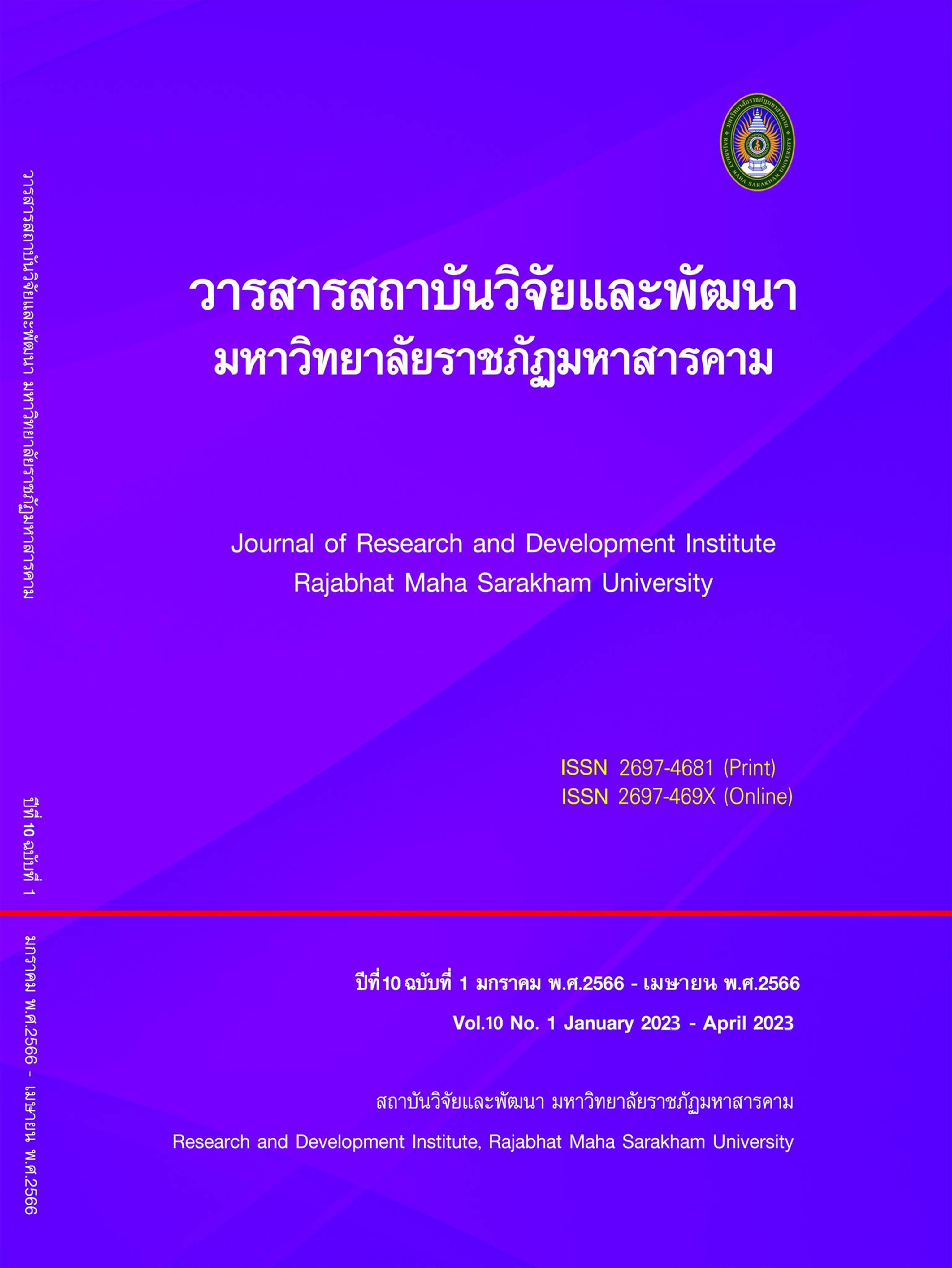Developing of creativity – based learning. to creativity dramatic Arts. For grade 10 students.
Keywords:
Creative-based learning management, creative arts-based learning, student satisfaction with creative-based learning managementAbstract
The objectives of this research were: 1.) to develop creative learning management as a base for creative thinking in dramatic arts. To be effective according to criteria 70/70 2.) To compare creativity in dramatic arts with creative learning management as a base. For students in grade 4 with a criteria of 70 percent 3.) To study the satisfaction of creative learning as a base for creativity in dramatic arts. For grade 10 students, the sample group was 33 students in grade 10 students, 2nd semester of the academic year 2021, 1 classroom, totaling 33 people, obtained by group randomization. The tools used in the research consisted of: 1.) a creative learning management plan based on 5 steps of 7 plans; 2.) an assessment form for creativity in dramatic arts; manage learning The statistics used in the data analysis were percentage, mean, standard deviation. confidence value Consistency
The results of the research were as follows: 1.) Creative learning management as the base. Effective 97.13/91.86 2.) After creative learning management as a base, For grade 10 students are creative in dramatic arts 88.76 3.) grade 10 students who receive creative learning as a base are satisfied with Creative learning as a whole is at the highest level.
References
Atthaput, P. (2015). The effect of using social media in combination with active learning. design subject and production of computer graphics media For undergraduate students. Bangkok : Naresuan University.
Chintalei, W. (2017). The construction of dancing arts activities to develop creativity of Prathomsuksa 1 students at Wat Tan Ain School. (Sophonchanupatham). Master's thesis (Art Education: Performing Arts Studies). Bangkok : Graduate School Srinakharinwirot University.
Kheawcha-um. P, (2017). Satisfaction with learning Thai dancing arts of students at Burana Marine Corps School. Chonburi Province. Patanasilpa Journal, 2(1), 22-35.
Ministry of Education. (2008). Basic Education Core Curriculum 2008. Bangkok: Thailand Agricultural Cooperative Assembly Printing House.
Naiyapat, O. (2008). Research Design: Quantitative Method. Qualitative and Integrated Methodology. Bangkok: Chulalongkorn University.
National Education Act. (2019, May 1). Royal Gazette, Volume 136, Chapter 57 A: Page 49.
Phanom Phrai Wittayakarn School (2020). Educational Quality Development Report (SAR) Phanom Phrai Wittayakarn School. Roi Et: Phanom Phrai Wittayakarn School Academic Administration Group Phanom Phrai District, Roi Et Province.
Puttaphol, K. (2020). Creative development of Prathomsuksa 6 students through creative dancing arts instruction (PIIACR). Bangkok: Patanasilpa Journal, 4(1), 38- 51.
Ruechaipanich, W. (2015). Creativity Based Learning (CBL). Journal of Education and Innovative Learning. 1(2), 23-37.
Sangkhao, P. (2008). Satisfaction of students toward library use. Sripatum University. Bangkok : Phranakhon Rajabhat University.
Silanoi, L. (2015). Research on 21st Century Learning Skills and Learning Achievement. Using a creative-based teaching model (BBL) of Mathayomsuksa 1 students in the subject S 21103 Social Studies 2. Khon Kaen: Journal of Education, Khon Kaen University, 38(4), 141-148.
Srisutham, W. (2019). The development of creative learning management based. To promote creative problem solving and academic achievement of Mathayomsuksa 4 students. Master of Education Thesis. (Science Education), Rajabhat Maha Sarakham University.
Suthumpun, T. (2019). Microsoft-IDC research results. Emphasize creativity as a key skill in an AI-driven future. Retrieved February 12, 2020, from: http://new.microsoft.com/th-th-2019-04-04-idc_skillsai_th/.
Tansuk, C. (2013). The development of a creative dancing arts curriculum according to the creative education approach. For elementary school students. Thesis Master of Education. (Curriculum and Tutorial). Silpakorn University.
Thiamkaew, N. (2018). Satisfaction with the service quality of the Academy of Sciences. Mahasarakham University Academic Year 2017. Maha Sarakham : Office of Academic Resources Maha Sarakham University.
Downloads
Published
How to Cite
Issue
Section
License
Copyright (c) 2023 ประสิทธิผล มะโนมัย

This work is licensed under a Creative Commons Attribution-NonCommercial-NoDerivatives 4.0 International License.
Articles that are published are copyrighted by the authors of the articles







